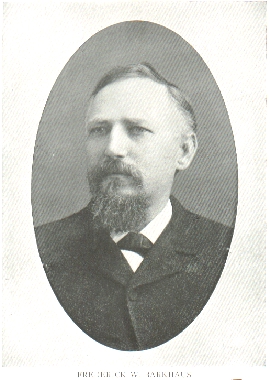
FREDERICK WILLIAM BARKHAUS
Frederick
William Barkhaus. The news of the discovery of gold in California spread
all over the world and brought to the state eager men from the most distant
points, who sought here an easy road to fortune. Lads, even, came, and
bore bravely the hardships which naturally resulted from an overwhelming influx
into an underdeveloped region, and many of them remained to become
substantial citizens. One of the arrivals of 1853 was a German youth,
Frederick William Barkhaus, who had been born in Hanover, November 22,
1836. He went direct to Placer County,and was there engaged in mining for
several years, with moderate success. He then decided to enter business
life, came to San Francisco, and established his store on Washington near
Kearney, and conducted it for forty years, although the location was later
changed. His was one of the early book and stationery stores of the city,
and became famous as the years went by. On January 11, 1858, he received
his final naturalization papers, and always gave to his adopted city and
country the most loyal service. For forty years he was a zealous
Mason. When he died, January 1, 1904, San Francisco lost one of its most
worthy citizens. For many years he was a director of the German
Hospital and also of the German General Benevolent Society. His
popularity is shown by the fact that he was tendered the nomination for
treasurer of San Francisco, but he declined it as he did not have any
inclination for public office.
In 1864 Mr. Barkhaus was
married to Louise J. Huber, a daughter of Joseph and Katherine (Mueller) Huber,
the father a native of Austria and the mother of Bremen, Germany, where he was
born in 1785, and she in 1806. Joseph Huber came to the United States in
1853 as a member of a grand opera company. He was a singer of note, and very
talented, but he was unfortunate enough to live in a period when proper
recognition was not given to grand opera, and so missed the appreciation and
financial rewards which would have been his today. His death occurred at the
age of eighty-four years. His wife died at the age of seventy-five.
Mr. and Mrs. Barkhaus became the parents of the following children: Henry, who is deceased, was a celebrated artist and died in Germany while studying abroad. He was in many respects a remarkable young man and, in fact, was a genius. His drawings and paintings showed a mastery of the art and were eagerly sought for. Although not twenty-one years of age, his personality was so marked that he numbered his friends by the score; and this was true of the old generation, among whom he was greatly admired. To this day, although nearly forty years has passed since his untimely demise, his name is very often brought up in art circles and among the men of the past generation. Had he lived there is no question but that he would have become a world famous figure. Mollie, who is also deceased; Frederick William; Louise J.; Nicholas, who is deceased; JuliA; William; Carl, and Katherine. None of the children have married, and the survivors are living with their widowed mother. Mrs. Barkhaus remembers much of interest during the early days of San Francisco. She was educated in the Sacred Heart School and recalls distinctly being taken to festivals held on the sands at third and Market streets, where the queen of the revels was crowned. She often recalls her father's attempts to awaken a love for fine music in the people of San Francisco, and regrets that his great talents met with so little recompense. Her life is made happy, however, by the love and care of her children, and her recollections of her husband and the part he played in the business life of their part of the city, where his name stood for sterling honesty and stalwart integrity. The business he founded and developed was destroyed by the great fire of San Francisco. The younger generation of Barkhaus are a credit to their parents, and to their families on both sides of the house.